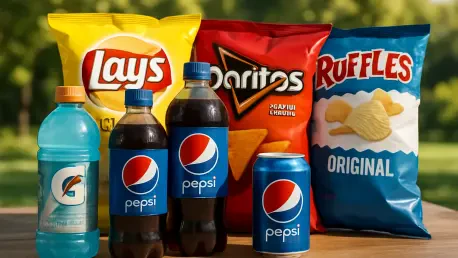In the evolving landscape of consumer preferences, PepsiCo is making strategic moves to refine its product offerings and effectively reduce operational costs. The company is embarking on an ambitious initiative to eliminate synthetic colors from its leading salty snack lines by the end of this year. This significant shift affects popular brands like Lay’s and Tostitos, reflecting a growing consumer demand for more natural product ingredients. Additionally, extensions of brands such as Cheetos and Doritos are planned to be free from artificial colors and flavors, marking a broader move towards more transparent labeling and health-conscious products. This shift not only caters to increasingly health-aware consumers but also aligns with broader industry trends where transparency and clean labels are becoming standard expectations rather than exceptions.
Expansion of Value Brands and Healthier Ingredients
PepsiCo’s strategic focus includes a renewed emphasis on expanding its range of value brands, such as Santitas and Chester’s, which have seen increasing appeal among budget-conscious consumers seeking good value without sacrificing taste. Concurrently, PepsiCo is innovating with the ingredients used in its products, enhancing selections with healthier oils such as avocado and olive oil, which are known for their heart-health benefits. This commitment to healthier ingredients extends beyond oils as the company plans to bolster its Frito-Lay and Quaker portfolios by enhancing items with additional protein, fiber, and whole grains. Such enhancements are intended to attract consumers who are not only looking for taste but also added nutritional value in their snacks. These strategies serve dual purposes: improving consumer perception of snack nutrition and helping to differentiate PepsiCo’s offerings in a competitive market.
Financial Performance and Strategic Synergies
Despite facing challenges, PepsiCo recorded modest growth in sales with a 1% increase in the second quarter, bringing in $22.726 billion. However, the company experienced a significant decline in net income, falling by 59% compared to the previous year. Internationally, PepsiCo has continued to perform well with 17 consecutive quarters of mid-single-digit organic revenue growth. In response to growing global input costs and tariffs, the company is intensifying efforts to exploit potential synergies between its beverage and convenient foods divisions. Special emphasis is being placed on growth areas such as zero sugar options, functional hydration products, and sports nutrition, all of which are gaining traction in today’s health-focused consumer market. Through these initiatives, PepsiCo projected a cautiously optimistic financial outlook with the anticipation of minor improvements in its annual revenue and a less pronounced decline in earnings per share than earlier forecasts.









